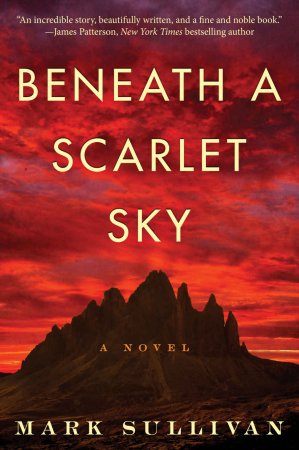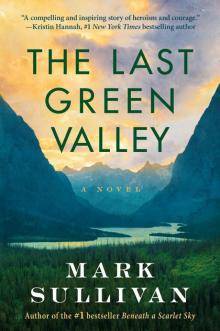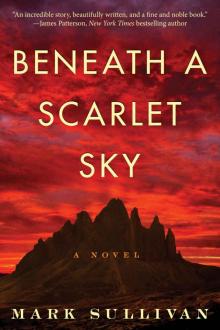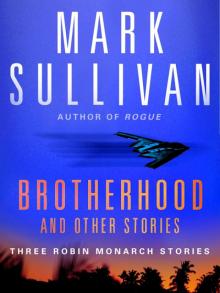- Home
- Mark Sullivan
The Last Green Valley Page 32
The Last Green Valley Read online
Page 32
December 24, 1945
Gutengermendorf, Soviet-Occupied east Germany
Later that same afternoon, Adeline was pulling an apple cake from Frau Schmidt’s oven and trying to stay cheerful even though it was Christmas Eve and Malia’s birthday and she hadn’t heard from her husband in nine months.
Putting the cake on the stove top to cool, Adeline heard Will and Walt giggling in the other room.
Herr Schmidt had taken them into the woods earlier and cut down a small tree. The boys were helping him decorate it with tinsel and ribbon and antique ornaments that had been in the Schmidts’ family for ages. Outside it was beginning to snow.
“I wonder how long the Soviets will let you celebrate Christmas,” Adeline said to Frau Schmidt, who was slicing bread on a cutting board. “It was banned for us.”
The older woman stared at her. “Banned? Not even Hitler did that.”
“Hitler’s not Stalin,” Adeline said. “Stalin’s worse.”
“I wouldn’t let my boarders hear you say that.”
“Never,” Adeline said. “Soon there will be secret police.”
“No,” she said. “No more Gestapo.”
“It will be a Communist Gestapo whatever they name it, and within a matter of months, they will have your neighbors, old friends even, ready to inform on you so they’re not shipped east.”
Frau Schmidt sat on a chair near the fire. She gazed into it and then looked at Adeline. “Will you inform?”
“Never,” Adeline said immediately. “Whispers like that took my father away forever. I won’t do it to someone else.”
“Good,” the older woman said. “Then we can trust each other.”
Will came into the kitchen. “It smells so good in here! Can I have some cake?”
“After dinner,” Adeline said. “Out of the kitchen now.”
“Awww,” he said.
Walt said, “Told you.”
“Told you,” Will said in a mocking tone as he walked past his older brother.
“The chickens and the potatoes should be done, Adeline,” Frau Schmidt said, using her cane to get back to her feet.
Before she could answer, they heard the sound of boots on the front stoop, and the three Soviet soldiers billeting with the Schmidts entered. Kharkov, a captain in his midtwenties, came in first. Adeline saw the glaze to Captain Kharkov’s eyes almost immediately and the broad, uncharacteristic smile he gave her and the bottle of vodka in his hands. She looked away and took a long, shaky breath. Frau Schmidt glanced at her in warning. He was a danger to Adeline. She felt it, too.
“Smells good!” Captain Kharkov said as the other men joined him, both junior officers, both younger. “When do we eat?”
Each of the other soldiers had been drinking as well. Each carried bottles two-thirds full.
“We’re pulling the birds out of the oven right now,” Adeline said, turning to the larger of the two ovens and opening it, revealing two golden-brown birds stuffed with onions and surrounded by red potatoes.
She set the pan on the counter and went about moving fresh bread and dishes of steaming boiled cabbage and brussels sprouts from the Schmidts’ garden on the long oaken table before returning to the birds. Using a sharp knife, Adeline quickly dismantled the birds into pieces and slices that she piled on a platter.
Frau Schmidt called out, “Dinner, Peter!”
Herr Schmidt soon arrived with two large bottles of homemade beer and took a seat at one end of the table with his wife at the opposite end. Captain Kharkov sat on one of the benches with his junior officers. Adeline sat by Frau Schmidt with Will to her right and Walt to Will’s right, opposite the Russians.
Adeline looked at all the food a moment and remembered the Christmas Eve before, when they’d had so very little to eat. She knew she should be happy, grateful, but as the roast chicken and the side dishes were being passed around, she could not help but think of Emil and what horrors he might be facing alone. A ball of emotion welled in her throat.
The Russians spoke among themselves as they ate and drank. Adeline was thankful to see they were nursing their vodka, not guzzling it like some Red Army soldiers she’d seen and even Marie, her own cousin, all tortured souls, bent on oblivion. But tonight, the three at the table felt harmless enough that she began to relax.
Still, her plan was to act as if the holiday were a Saturday night. It would be cold in the church, but she would bring her heavy clothes and blankets, and Christmas Day would be dawning before she knew it. She wanted to be back before the boys woke up. Though Adeline did not have the money to buy her sons presents, the Schmidts did, and she wanted to see the expression on Will’s and Walt’s faces when they opened—
“You are lucky, Adeline,” Captain Kharkov said, startling her from her thoughts.
She looked over at him with a puzzled expression.
“Your sons,” he said. “You have them with you while my good wife and baby boy are alone in Leningrad.”
“I am lucky,” she said. “I’d be luckier if my husband wasn’t in a prison camp.”
“That’s true,” Kharkov said, and poured himself another finger of vodka.
“I’m full,” Will said, rubbing his stomach after he’d cleared his plate.
“No room for your mother’s kuchen?” Frau Schmidt said.
Will frowned. “I didn’t say that.”
“You’re sure?” Adeline teased.
“Mama!” Will said. “That’s not nice.”
Adeline smiled, got up, and returned with the cake. The boys each grabbed a slice. Will destroyed his in three bites. Walt took his time, nibbling on his as the plate went around the table. As Frau Schmidt passed the plate with the last piece on it to Adeline, Captain Kharkov finished his vodka and poured another finger.
“That was an excellent meal,” he said, speaking in Russian and raising his glass to the Schmidts and to Adeline. “We thank you because it reminds us of the perversity of a system that allows two old, relatively useless people like the Schmidts here to own so much land and to reap so much bounty from it.”
Adeline realized he’d been saying this directly to her because the Schmidts didn’t speak Russian. She flushed and looked away from him.
Kharkov went on. “Under our system, in the old days, the Schmidts would be judged ‘kulaks’: people who have grossly overbenefited from the labor of others. In the old days, they would have been thrown off this land. Isn’t that true, Adeline?”
Adeline looked up to find him studying her. “Yes.”
She knew she should have left it at that, but she added, “And the land would have been given to idiots who knew nothing about farming. No surprise that they produced nothing, and people starved.”
Captain Kharkov’s eyebrows flickered, but he said nothing, just gazed at her a few more moments before downing his glass and pouring himself another. Adeline got up and cleaned the kitchen until it sparkled. She dried the carving knife last, turned from the sink, and said, “Okay, boys, time for bed.”
“It’s only just dark,” Captain Kharkov said. “Sit, have another drink with us.”
“The beer has already made me a little tipsy,” Adeline said. “Will? Walt?”
Will yawned as he got up. “I am tired.”
“Me, too,” Walt said. “Mama, will we get Christmas presents tomorrow?”
“We’ll see,” she said, smiled at them all, nodded to Captain Kharkov. “Sleep well. We’ll see you all tomorrow.”
“Tomorrow,” Kharkov said. He poured another drink and saluted her as they went out the door into the snow.
A half inch had fallen on the bare ground, enough to make the landscape look pretty and safe as Adeline and the boys went to the outbuilding. She got them changed, and as they had almost every night since Emil disappeared, they held hands and prayed for him before she had them climb into the bed.
“Tomorrow is Jesus’s birthday,” Will said. “He was born with donkeys.”
His mother smiled and said
, “Sort of.”
“And we believe what Jesus taught,” Walt said. “That’s why we celebrate Christmas, right, Mama?”
Adeline hesitated, but then nodded. She was going to tell them good night and leave but changed her mind and picked up the Bible Frau Schmidt had given her. She flipped to the book of Luke and read them the story of the Nativity.
“See, there were donkeys,” Will said when she finished.
“Yes, there were,” Adeline said, laughed, and kissed her younger and then her older son on the head. “And sheep and other animals.”
She kept the light on long enough to put on her coat and to gather up the quilt, two blankets, and the pillow and the wool knit hat Frau Schmidt had given her. She turned to tell them good night, only to see them already sleeping. She thought of Emil again, how he would never know moments like this, and despite the wonderful food filling her belly, she felt robbed of love and time.
Adeline went out the door into the short hallway, shut it, and locked it, thinking, They robbed me; they robbed my sons; and they robbed Emil. They’re still robbing us!
Outside, the snow was still gently falling. Adeline looped around the barn to get her bearings, then set off by dead reckoning through the darkness and the snow toward the tree line that marked the village. She wandered off course twice before finding the leafless trees and following them past the backs of the village homes before coming parallel to the old church.
As was her custom, Adeline went beyond the church to pee and then went to the rear door, finding it ajar. But when she pushed open the door to listen for the sounds of other women, she heard nothing. The glass windows of the church had been boarded over for the winter, so once inside, she felt comfortable digging around in her bag for a candle and some matches with the door shut but not barred in case another woman wanted refuge for the night.
She lit the little candle, which threw enough light that she could see her breath in billowing clouds and confirm that the church was indeed empty. She shivered and understood why. Boarded up like this, the building got little or no heat during the day. In fact, it felt colder in there than it had outside in the falling snow.
Adeline went to the pew where she normally spent her Saturday nights and started preparing her bed. As she did, she thought about Walt saying, And we believe what Jesus taught, right, Mama?
She sat a moment with her hands clasped and felt torn between wanting to go down on her knees and pray and fearing to pray because she would not be heard or heard in the wrong way as she’d been that day near the Reichstag when they had no food and no shelter. In the end, she bowed her head and asked God to forgive her for not praying much of late.
“It’s been hard without Emil, Lord,” she whispered, that ball of emotion swelling in her throat again. “Taking care of the boys and working for the Schmidts . . . I’m grateful for the roof over my head and the good food we eat. I am. But please watch over Emil, wherever he is. Protect him, Lord. He’s a good man. The only man I’ve got or want. So please, bring him back to us, and keep me and the boys safe in the meantime.”
She bowed her head and sighed before unfolding the quilt and blankets. She was arranging the pillow and about to blow out the candle when the rear door pushed open and someone shone a flashlight inside. Several of the women who took refuge in the church had flashlights, so she stood there, waiting to see which one had decided to brave the cold.
Captain Kharkov stepped inside, looked around, saw her standing in the candlelight. He smiled drunkenly and held up the nearly empty bottle and waved it around at the interior of the church.
“How romantic, Adeline,” he said. “What a perfect place.”
Chapter Thirty
Six hours earlier, that same Christmas Eve
Poltava, Ukraine
Watching Nikolas die in front of him shook Emil in ways he did not expect. He had hated the man in life, and yet he felt some pity for the way Nikolas left it, terror filled and unforgiven, sure that he was about to face judgment.
I’m not facing judgment, Emil thought after covering Nikolas’s body and dragging it outside to freeze. There is nothing beyond this life. The only thing you can rely on is yourself.
Emil worked until he almost dropped that day but relied on himself to reach the concrete quota Ivanov had set. He sat by the little woodstove after pouring the last of the concrete into the block molds. He closed his eyes.
I am enough. I alone can survive . . .
The triangle began to ring, signaling the end of the workday. Emil opened his eyes in a daze, feeling in his chest and in his head the same darkness that Nikolas had described, so heavy and cold, he did not know if he could get to his feet. He did, finally, but he was dizzy and had to hold on to the wall before he could gather up his hat and gloves and go out into a full-on blizzard. Nikolas’s corpse was already almost buried in the falling snow.
“Line up!” the Soviet guards shouted. “Marching formation!”
Emil went to one of the guards he was familiar with, pointed out Nikolas’s body, and was told the burial detail was coming. He paused to watch the snow build on Nikolas’s frozen body, then took the dead man’s place in line. He’d gather wood scraps tomorrow.
Trudging through the storm to the city hall basement to eat, Emil felt like he might collapse at any moment. His mind and inner voice turned reptilian, bent on survival, and goading.
One foot in front of the other. One foot . . .
I am enough. I am Emil Martel, damn it. I am . . .
And then Nicholas’s words, We were doomed the moment we took the gun and decided to pull the trigger.
At the same time Emil was hearing the echoes of Nikolas in his mind, a prisoner several rows in front of him staggered and collapsed in the snow. A guard went to the downed man and kicked him. When he didn’t respond, the guard dragged him to one side and left him.
Barely able to stand himself, Emil gazed dully at the new corpse, hearing Nikolas again in his head, It’s just a matter of time.
The prisoners began moving. Emil tried to follow them, one foot, one step, one foot, one step. He got dizzy again, wobbled, and almost went down. Black spots appeared and swam in his vision. He thought he was going to lose consciousness and die in the snow, another frozen body on the death cart, and panicked, tried to will himself alert. Emil staggered finally and went down on his knees. He had nothing left. He surrendered.
I can’t do it. I am not enough. I’m just a man. I’m sorry, Adeline. I can’t do this alone . . . I need help. I need . . .
A hand grabbed him roughly under the armpit and jerked him to his feet. It shocked Emil back to semi-alertness, and he looked in confusion at the guard.
“You’re not dying on me today,” the guard said. “Ivanov wants you kept alive.”
Emil felt his balance return, said, “I’ll be better once I’ve eaten.”
The guard nodded, said, “The mess is just ahead there.”
The line slowed at the entrance to the city hall’s basement. The area was lit by floodlights. Emil had his head down, defeated, cut off from hope. He felt like he had nothing left to fight with beyond his ability to stand up and move with the line toward food and sleep. He knew he was so weakened, he would die if disease hit him.
Maybe it would be better. Less torture in the long run for Adeline and the boys. And if I’m going to face judgment, I’d rather do it sooner than later.
Emil got wobbly again, his despair deepening and widening before yawning bottomless with sheer desperation and fear. Feeling like he was falling away into the darkness, he did the only thing he could think of: he threw back his head, exposed his face to the driving snow, and raised both arms to the night and the storm.
“You hear me?” he croaked. “If you do, take me sooner than later.”
The line moved again toward the stairs. Emil dropped his arms and slouched forward a step. Why was he even bothering to eat? It was over. He’d lasted seven months. He could not do it alone anymore. And God? God
was just a story in a—
“The bee is a miracle,” he heard a man say in German, but in an odd, thick accent. “No bee, no flowers, no fruit, no beauty, no life.”
The line moved a foot. Emil went with it, lifting his head and turning to search for the source of the voice.
Out of the blizzard, a pale apparition appeared: a prisoner caked in snow led the pony and the death cart coated in hoar, with four bodies already aboard and two other prisoners helping from the back, driving the wheels and the weight through fifteen centimeters of snow.
The lead prisoner had his hood up as he tied the pony to a post about twenty meters from Emil and turned to the two others, saying, “Eat honey and you’ll live a long life. It’s a gift from God. Makes you strong. Makes you live long. We’ll eat first? Then the graveyard, yes?”
Emil squinted, shook his head in disbelief, but then, as if drawn by some magnetic force, he left his place in line and walked toward the men of the death detail as they made for the back of the meal queue.
Emil followed them, calling out, “Corporal?”
It was windy, howling. The three prisoners kept walking.
“Beekeeper,” Emil shouted. “Survivor of Stalingrad!”
Two of the men continued on. But the one who’d been leading the pony stopped, pulled back his hood, and turned to look at Emil with a puzzled and then amused expression, as if someone had whispered a joke in his ear that he was only now getting.
“Martel,” Corporal Gheorghe said, grinning at him. “I said I’d see you again, and there you stand!”
Gutengermendorf, Soviet-Occupied east Germany
Captain Kharkov shut off the flashlight, put it in his pocket, and strolled in Adeline’s direction, holding his vodka bottle in one hand while unbuttoning his long coat with the other.
“A perfect, perfect place,” the Russian said. “I’m surprised none of us thought of it when we tried to figure out what became of all the good women of Gutengermendorf on Saturday nights. But your tracks in the snow did not lie, and here we are.”
“No,” Adeline said. “Not with me.”

 Beneath a Scarlet Sky
Beneath a Scarlet Sky The Last Green Valley
The Last Green Valley Beneath a Scarlet Sky: A Novel
Beneath a Scarlet Sky: A Novel Brotherhood and Others
Brotherhood and Others The Purification Ceremony
The Purification Ceremony